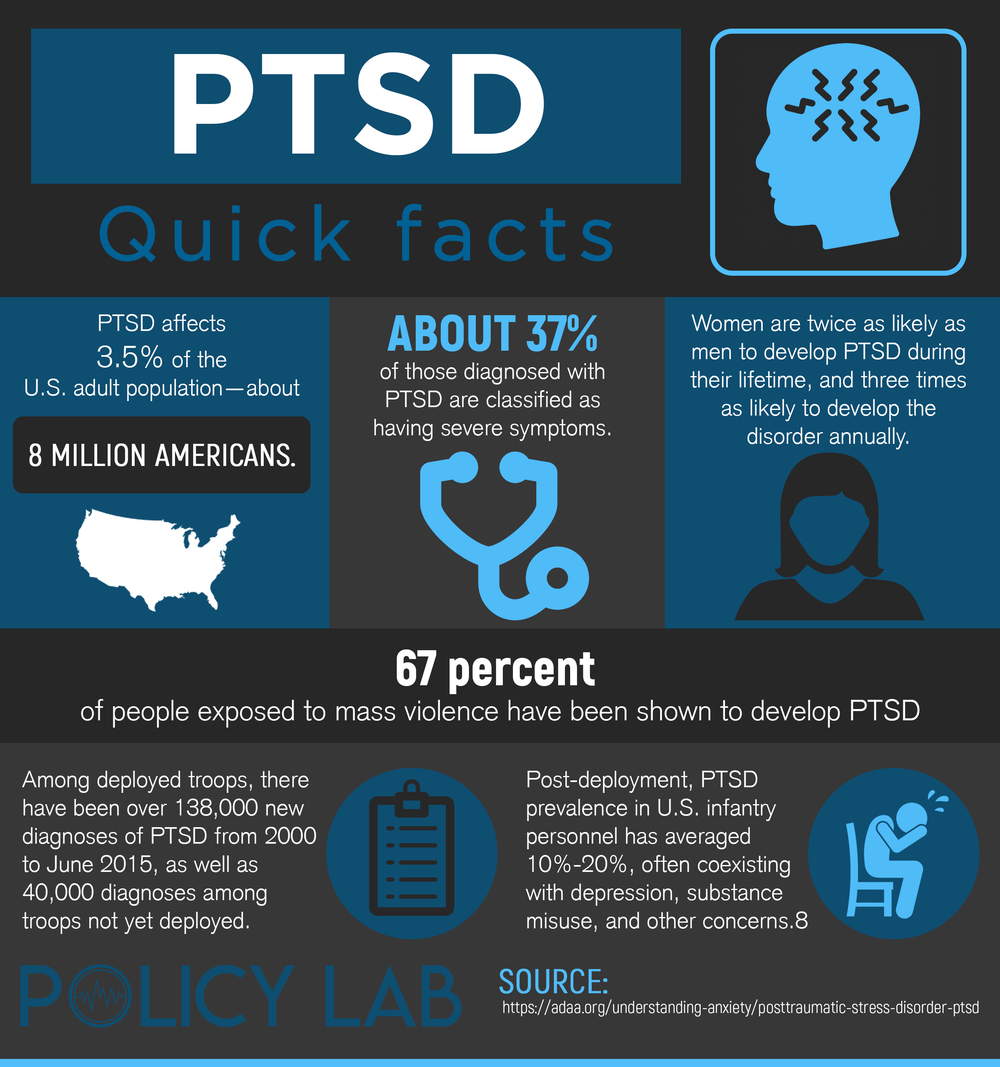Match to PTSD Clinical Trials
Post-traumatic stress disorder (PTSD) is a mental health condition that can happen after experiencing a traumatic or terrifying event. Anybody, regardless of their age or gender can develop PTSD; however, experiencing a traumatic event doesn’t necessarily mean that a person will develop this disorder.
PTSD is different from the sense of discomfort or sadness that people feel when recalling negative experiences; individuals who suffer from PTSD tend to experience disturbing thoughts, trouble sleeping, and both mental and physical distress on a regular basis, particularly when triggered by internal or stimulus including sounds, smells, places or feelings.
A doctor or a mental health professional will diagnose a person with PTSD after he or she has experienced symptoms for at least a month after the traumatic event occurred. Because PTSD can affect anybody at any point in time, there are treatments available to help you deal with your symptoms and overcome trauma. Currently, the most effective treatments include a mix of psychotherapy and medication to help the person deal with the depression or anxiety that can happen alongside PTSD.

What Are Clinical Trials?
A clinical trial is a study conducted by medical professionals aiming to improve an existing treatment or find new alternatives for treating, preventing or diagnosing medical conditions. Many clinical trials begin at laboratories where research teams experiment with new drug ideas that could later become a treatment for a particular condition, then these medications are tested on volunteer human subjects to determine important factors such as it’s toxicity, side effects, and effectiveness.
Not all clinical trials involve testing new drugs or medications for treating a disease; some clinical trials rely merely on observation to determine how individuals respond or react to certain therapies or interventions. Other research studies might only want to collect blood or tissue samples to be later analyzed.
Regardless of the type of clinical trial, these studies are very rigorous and follow a predetermined set of rules and guidelines mandated by internal and external regulatory agencies. This means that clinical trials tend to be safe, and all participants are always closely monitored to ensure the trial runs smoothly and without any major inconveniences.
What Happens During A PTSD Clinical Trial?
Before you start participating in any type of clinical trial, a member of the research staff will make sure the entirety of the study has been explained to you, and they will ask you to sign an informed consent document.
An informed consent document is an official study document that explains the purpose of the study, any potential benefits and risks, and any other important information that you should know about before consenting to participate. It is important to note that even if you sign an informed consent document you are free to withdraw your participation from the trial at any point in time without consequence.
Because all clinical trials are different, what happens after giving consent will vary greatly depending on the type of study you enrolled into. Some mental health clinical trials involve medications; in these studies it is likely that the participant will be randomly assigned to a group to either receive a medication or a placebo. Researchers do this do determine the effectiveness of the medication whilst eliminating potential biases and confounders.
Will I Benefit From Participating In A Clinical Trial?
It is not possible to know whether a drug or a treatment being study in a clinical trial will be effective until it has gone through all phases and has been tested in many individuals. However, clinical trials are extremely important because they allow the medical field to move forward with the knowledge necessary to continue searching for cures, treatments, and preventive strategies for all kinds of conditions.
People participate in clinical trials for different reasons; some individuals with illnesses decide to participate in clinical trials for the opportunity of a potential new and effective treatment. Others choose to enroll in clinical trials to help science and medicine advance and helping others that might benefit from new drugs and treatments down the line.
Who Can Participate In A Clinical Trial?
Most clinical trials have an inclusion and exclusion criteria that outline who can and cannot participate based on the purpose of the study. While some trials want to have a very diverse sample and accept all kinds of volunteers, others might only look for individuals with a certain condition like PTSD or anxiety to test the medication or intervention on the specific population it is intended for.
Where Can I Find A PTSD Clinical Trial?
Clinical trials are often conducted by hospitals, universities, or contract research organizations hired by pharmaceutical companies. If are thinking about enrolling in a PTSD clinical trial and would like to know what is available in your area, contact your doctor or mental health professional, or review the following trials that are currently looking for participants.
Match to PTSD Clinical Trials
Sources
- PTSD: National Center for PTSD. (2018, August 07). Retrieved from https://www.ptsd.va.gov/understand/what/ptsd_basics.asp
- Post-traumatic stress disorder (PTSD). (2018, July 06). Retrieved from https://www.mayoclinic.org/diseases-conditions/post-traumatic-stress-disorder/diagnosis-treatment/drc-20355973